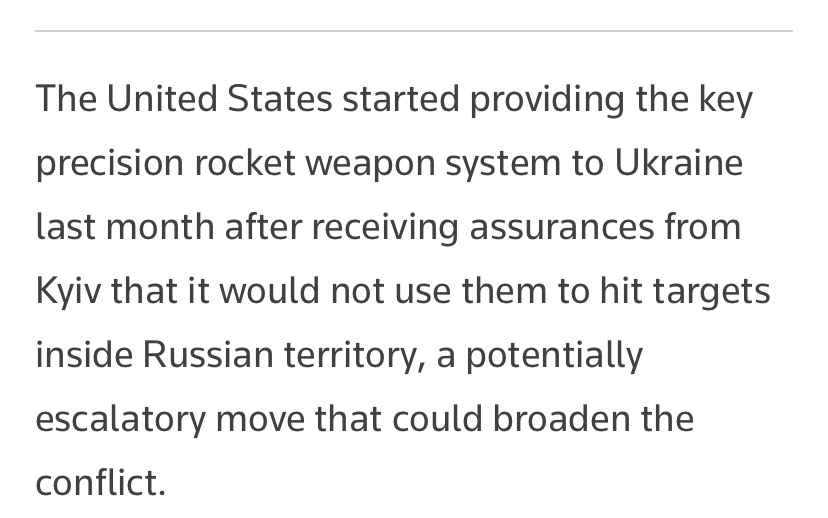
<THREAD>Sorry, but nuclear deterrence is a two-way street. Just as NATO’s nuclear weapons deter Russia, so Russia’s deter us.
This isn’t fair or just. But it's the reality of life under the shadow of the Bomb. Ignoring the risk of escalation is a recipe for catastrophe. (1/17)
This isn’t fair or just. But it's the reality of life under the shadow of the Bomb. Ignoring the risk of escalation is a recipe for catastrophe. (1/17)
Nuclear deterrence has been a mixed blessing during the Ukraine war.
On the plus side, I’m sure it’s been a major factor in dissuading Putin from launching strikes on NATO to try to interdict equipment on its way to Ukraine.
Unfortunately, Russia also has nukes. (2/17)
On the plus side, I’m sure it’s been a major factor in dissuading Putin from launching strikes on NATO to try to interdict equipment on its way to Ukraine.
Unfortunately, Russia also has nukes. (2/17)
Biden’s openly expressed concerns about “Armageddon” are likely limiting the extent of U.S. support to Ukraine.
The funny thing is that many of his critics are, in other contexts, strong believers in nuclear deterrence. (3/17)
The funny thing is that many of his critics are, in other contexts, strong believers in nuclear deterrence. (3/17)
https://twitter.com/kaitlancollins/status/1578182142315532288?s=20&t=KcWad4yQOAl_AVzyxB8XFQ
Only a few folks are willing to say openly that we should not be deterred by the risk of nuclear escalation. @MatthewKroenig is. I respect his honesty—especially because it undermines his theory about the value of more lethal nuclear arsenals. (4/17)
https://twitter.com/MatthewKroenig/status/1502062049987371008?s=20&t=6uWHcT5KQBH3UrXBSRN1sw
Instead, many Biden critics (wrongly) argue the United States is “self-deterred” from taking more action. It’s a way of implying that fear of nuclear war is irrational and Biden should ignore it.
But this isn’t self-deterrence; it's the unpleasantness of BEING deterred. (5/17)



But this isn’t self-deterrence; it's the unpleasantness of BEING deterred. (5/17)




Others simply assert (complete with scare quotes) that we should just ignore the risk of escalation in forming policy—which is effectively another way of saying the same thing. (6/17)
https://twitter.com/chipmanj/status/1510044412222582786?s=20&t=6uWHcT5KQBH3UrXBSRN1sw
Indeed the U.S. has tried to escape *mutual* deterrence for almost 80 years. Missile defenses, for example, are as much about trying to prevent us from being deterred as about deterring adversaries.
But I digress... (7/17)
media.defense.gov/2019/Jan/17/20…
But I digress... (7/17)
media.defense.gov/2019/Jan/17/20…

Here’s the thing. None of the people I’ve cited are psychopaths. For all their Twitter bravado, if they were elected leaders responsible for the lives of tens or hundreds of millions of people, they would act more cautiously than they are now demanding of Biden. (8/17)
To be sure, being deterred by Russia isn’t good or just.
Russia’s invasion was evil and illegal. It is just for Ukraine to fight to liberate its territory (including Crimea) and just for the U.S. and its partners to assist. (9/17)
Russia’s invasion was evil and illegal. It is just for Ukraine to fight to liberate its territory (including Crimea) and just for the U.S. and its partners to assist. (9/17)
The rightness of Ukraine’s cause, however, should not blind us to the appalling consequences of a nuclear war, even if the responsibility for starting such a war would inevitably lie with Putin. (10/17)
Put another way: The uncomfortable reality for supporters of Ukraine (including me) is that the interests of Ukraine and its backers are closely, but not perfectly, aligned.
Rationally, Zelenskyy is more willing than Biden to risk nuclear war over Ukrainian territory. (11/17)
Rationally, Zelenskyy is more willing than Biden to risk nuclear war over Ukrainian territory. (11/17)
People perform extreme wishful thinking to try to avoid facing the profoundly painful but very real resulting trade-offs by telling themselves, in essence, that a nuclear war wouldn’t be that bad. (It really could be.) (12/17)
https://twitter.com/minna_alander/status/1579185759286091776?s=20&t=IzQugVANPlYXwPh2Z8F5JQ
However, unless you really, honestly believe that the likelihood of the Ukraine war’s turning nuclear is vanishingly small (as a few do), then the possibility of Armageddon should factor into your policy cost-benefit analysis. (13/17)
I support the military assistance given to Ukraine so far; the benefits seem to me to outweigh the risks—in part because the United States has imposed strings, including on the supply of HIMARS. (14/17)
reuters.com/world/europe/u…
reuters.com/world/europe/u…

Going forward, the U.S. and its partners should ask themselves what limits to the conflict would keep the risk of nuclear war to a tolerable level.
What those limits should be is a topic for another time, though @CChivvis has some good thoughts. (15/17)
theguardian.com/commentisfree/…
What those limits should be is a topic for another time, though @CChivvis has some good thoughts. (15/17)
theguardian.com/commentisfree/…

For now, my main purpose is simply to argue that such limits are in the interests of the U.S. and its partners, and to point out that we have two tools to encourage Ukraine to accept them: the weapons we supply and the conditions of supply. (16/17)
In short, there's no shame in being deterred by the threat of nuclear war. That’s what we tell our adversaries and we’re right when we do so. #keeprealismreal, as @ProfPaulPoast would say. (17/17)
• • •
Missing some Tweet in this thread? You can try to
force a refresh








